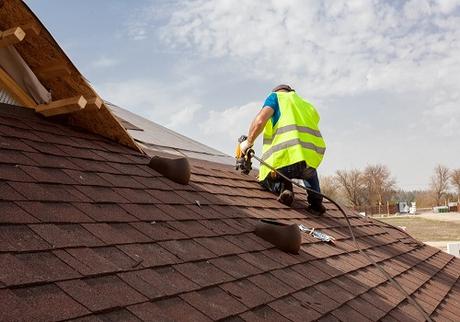When you talk about roofs, their durability will depend on the type of roofing material you choose. Some types of roofing material require a lot of maintenance since they are more vulnerable to damage. But there are also some that require very little maintenance.
Whether you’re looking for a roof that suits your house or you’re just learning how to maintain properly the roof you have, it’s important that you understand the pros and cons of each roofing material.

Asphalt Shingles
Asphalt shingles are one of the widely used roofing material in North America. In fact, almost 80 percent of homeowners have asphalt shingles in place on their roofs. As popular as they can be, asphalt shingles have pros and cons, too.
Pros:
- Good resistance to fire and wind
- Inexpensive
- Moderate in weight, which makes them ideal for almost all roof slopes
Cons:
- Not eco-friendly
- Not known for their durability as compared to other roofing materials
- High rate of replacement or repair, depending on your geographic location
- Require special treatment to resist algae if in a humid climate
Metal Roofs
Metal roofs are another type of roofing material that is very attractive to most homeowners because of longevity, energy efficiency, and minimal maintenance needs.
Pros:
- Lightweight
- Minimal maintenance
- Energy efficient
- Last for 40-70 years
- Eco-friendly
- Fit a variety of roof slopes
Cons:
- Not all homeowners appreciate the look of metal roofs.
- More expensive than other roofing materials
- Noisy, especially if there’s heavy rain or hailstorm
- Prone to damage. Metal roofs are also vulnerable to damage, especially if a heavy debris falls on them.
Slate Roofing Tiles
Slate roofing tiles are one of the most popular types of classic roofing materials. In fact, many classical homes or old buildings have slate tiles installed on their roof. They are an ideal choice for homeowners who want to add a special touch to their home.
Pros:
- Durable
- Excellent resistance against fire and wind
- Elegant appearance
- Made from all-natural materials and are also recyclable
Cons:
- They are very heavy and can only be installed in homes that have proper support to bear the weight.
- Hard to install and replaced (if damaged)
Cedar Roofs
The rustic, weathered look of cedar roofs makes them an ideal choice for homeowners who are looking to add a special touch to their home. Cedar roofs are aesthetically appealing, but that is not to say that they don’t have drawbacks, too.
Pros:
- Cedar roofs give your home a natural look.
- They are environmentally friendly too since they are made from all-natural materials and are also recyclable.
- Energy efficient
- Cedar roofs can last longer than asphalt shingles.
- Resistant to strong winds and severe storms.
Cons:
- Not very good against fire
- Very expensive
- Requires regular maintenance
Clay Tile Roofs
Clay roof tiles come in a wide variety of unique colors and styles. They are a perfect match for brick homes or homes with a Spanish or Mediterranean architectural style.
Pros:
- They give your home a more natural look.
- Clay roof tiles are known for their longevity. They can last for decades, much longer than most types of roofing materials.
- Excellent resistance against fire, rot, and insect damage.
- They can stand up against extreme weather conditions.
- Minimal maintenance required
- Clay roof tiles have excellent insulating properties, which makes them extremely energy efficient.
Cons:
- Heavy and difficult to install. Clay roof tiles can only be installed on homes that can bear their weight, and the installation must be done by a professional roofing contractor.
- Initial cost can be very expensive.
- The tiles may break if you walk on them.
- Colors may fade over time.
Concrete Tile Roofs
Concrete tile roofs have become an increasingly popular choice of roofing material by homeowners over the years because of their durability, unique aesthetics and inexpensiveness.
Pros:
- Far more inexpensive when compared to its clay counterpart
- Incredibly durable. They can withstand hurricane force winds and stand up to most extreme weather conditions such heavy rains, snow, and hail.
- Good in reflecting heat from the sun, which makes them ideal for homes located in hot climates.
- Require minimal maintenance to stay in top condition.
- They make a very good long-term investment.
Cons:
- Initial costs can be very high.
- The heavy weight of concrete tile roofs will require additional support to bear the load.
- Their colors will fade over time.
Explore All Your Roofing Options Before Making a Decision
Always explore your options when making a decision on the type of roofing material suitable for your home. Don’t be afraid to consult a professional roofing contractor like John Beal Roofing to help you decide which roofing type is suitable for your house. In addition to consulting a professional roofing contractor, you might as well ask for a quote for each type of roofing material, especially if money is your main decision-making factor. This way you’ll be able to choose the best roofing material for your home at the best price!
============================================================

Matt Tennant is a writer contributing pieces for John Beal Roofing. His passion for his craft allows him to be able to write unique and creative pieces for his readers. He strives to make sure his pieces are informative and entertaining, given his fascination with his topics. He likes to paint during his free time.
============================================================
